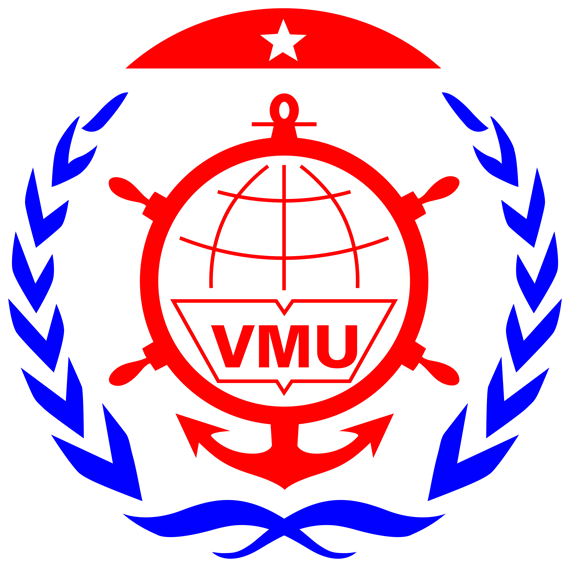1. Introduction
|
Program title: |
Bachelor of Telecommunication Engineering and Computer Networks |
|
Graduation degree: |
Bachelor's degree |
|
Study model: |
Full-time |
|
Total credits: |
132 |
|
Used language: |
Vietnamese |
|
Training duration: |
4 years (8 semesters) |
|
Responsible Faculty: |
Faculty of Information Technology |
|
Website: |
|
|
Address: |
Room 301, 3rd floor A4 Building, Vietnam Maritime University 484 Lach Tray - Le Chan - Hai Phong |
The Telecommunication Engineering and Computer Networks training program at Vietnam Maritime University, designed by the Faculty of Information Technology, is designed to equip students with solid knowledge and skills in Information Technology, particularly in the fields of telecommunications and computer networks. The program includes both theoretical and practical courses, ranging from basic subjects such as Algebra, Discrete Mathematics, to specialized courses such as Computer Networks, Network Security, Network Programming, and System Design and Administration. Students are also provided with soft skills, English language proficiency, and optional courses to enhance their ability to work in an international environment and stay ahead of new technological trends. The goal of the program is to train Bachelor's degree graduates in Telecommunication Engineering and Computer Networks, who are capable of designing, implementing, and operating computer network systems and IT applications, while also being creative, flexible, and adaptable in any work environment. Graduates from this program will be highly competitive in the Asia-Pacific region, contributing to national development, safeguarding the country, and integrating deeply into the international community.
2. Curriculum
The training program is divided into 8 semesters, each consisting of mandatory and optional courses as follows:
Semester I: Students start with basic courses such as Algebra, Discrete Mathematics, and General Law. Introduction to Information Technology provides an overview of the IT industry, helping students understand the fields, trends, and opportunities within the industry. Computer Architecture and Peripherals introduces students to the basic hardware structures of computers and peripheral devices. Optional courses such as MS Office Suite, Basic English 1, and Soft Skills 1 help students develop communication and teamwork skills.
Semester II: Students continue with core courses like Marxist-Leninist Philosophy, Calculus. Essential foundational courses such as C Programming Techniques rovides knowledge of basic programming and how to develop programs in C language. Database Systems helps students understand how to design, manage, and query databases in database management systems. Computer Networks provides fundamental knowledge of computer networks, protocols, and the functioning of networks. Introduction to Software Technology equips students with foundational knowledge of software and the software development process.
Semester III: The program moves to advanced topics with courses like Marxist-Leninist Political Economy, Probability and Statistics. Data Structures and Algorithms teaches students about basic data structures and efficient algorithms for processing and optimizing computational problems. Object-Oriented Programming introduces object-oriented programming principles, allowing students to develop software applications using this approach. Students will also take Core Java Programming, learning how to develop basic Java applications. Students can choose between Python Programming or Advanced Python Programming to further enhance their programming skills.
Semester IV: Courses such as Information Security and Privacy, Object-Oriented System Analysis and Design, and Graph Theory help students grasp security concepts, software design, and data structures. Microprocessor Engineering helps students understand computer hardware and microprocessor systems. Optional courses such as Information Technology Project Management and E-Commerce help students develop management skills and the application of technology in business.
Semester V: Students continue with courses such as Application Development with Databases, Web-Based Application Development. Artificial Intelligence teaches students about AI algorithms and methods, as well as how to apply them to solve real-world problems. Telecommunication Engineering and Computer Networks Internship: Provides students with practical experience in the field of telecommunications and computer networks. Optional courses such as Semi-Structured Data Representation and DevOps Implementation Methods broaden students' knowledge of modern technologies.
Semester VI: Courses such as Embedded Systems, Image Processing, Network Programming, and Open Source Application Development equip students with advanced programming skills and knowledge of new technologies. Network Operating Systems provides students with knowledge of network operating systems and how they function in network environments. Optional courses such as Robotics and Intelligent Systems and Software Testing help students develop practical skills.
Semester VII: Students take courses like Computer Vision, Internet of Things Technology provides knowledge about technologies for connecting smart devices and sensors in the Internet environment. Network Security teaches students principles and techniques for securing computer networks. Network Design and Administration provides in-depth knowledge of designing, implementing, and managing computer networks. System Integration Project helps students apply theoretical knowledge to practical projects, integrating learned concepts into system development. Optional courses such as Big Data Processing, UI/UX Design, and Deep Learning Techniques offer in-depth knowledge of new technologies and applications.
Semester VIII: The final semester includes Graduation Internship and Graduation Project, offering students the opportunity to apply their knowledge in real-world environments. Optional courses such as Advanced Network Design and Administration and Cloud Computing prepare students for future challenges in their professional careers.
